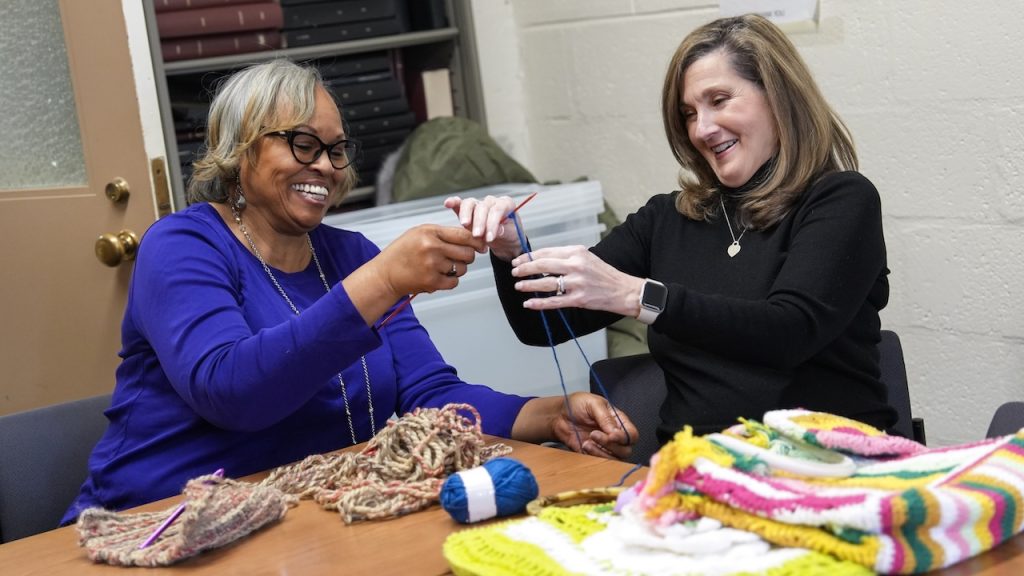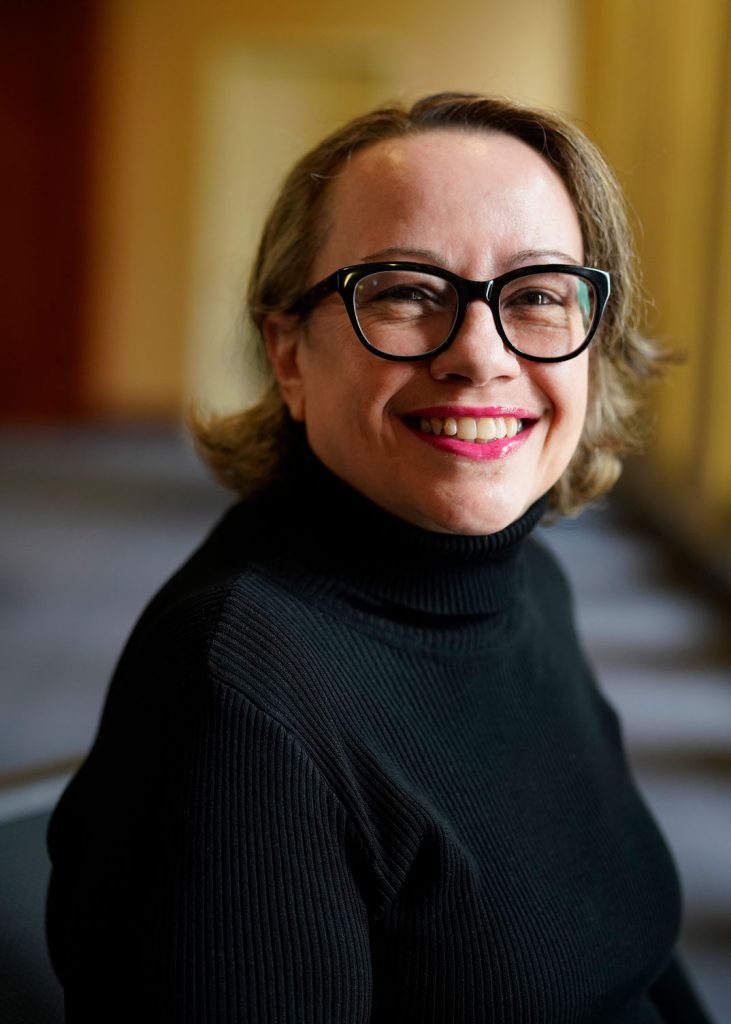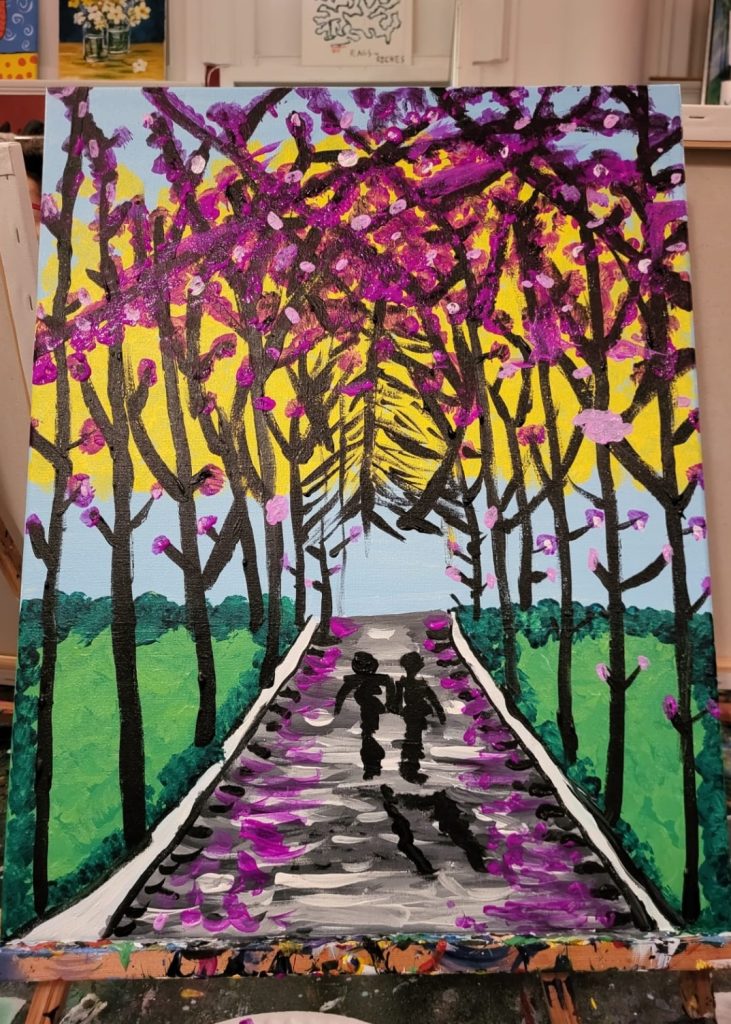The Urban Anthropologist Who Makes Public Art
Aseel Sawalha, Ph.D., is on sabbatical this semester, putting the finishing touches on a book about creative refugees from Syria and Iraq who have transformed the culture of Amman, Jordan. But when she returns in the fall, she will have completed another major work: her first-ever public art sculpture. Using her signature medium—discarded academic textbooks whose pages she rolls and crimps into sculptural forms—she is building a 13-foot-tall tower of cascading books, supported and protected by metal, that will be installed in Riverside Park at West 145th Street as part of a program with New York City’s parks department and the Art Students League.
“My idea was to use books for the sculpture and let it deteriorate and disintegrate in the park because books come from trees,” said Sawalha. The public art program required a more permanent structure, which led her to add an entirely new medium—metal—to her project. “I started taking welding, and now I’m in love with metal art. It was not on my map at all.”
This April, her book art will also be part of a show in Montclair, N.J., gallery called The Space, featuring other Arab-American artists. “Art is a place of healing for me,” said Sawalha. It is also influenced by her childhood in Palestine, where she grew up watching her mother embroider and women roll grape leaves, two practices that have manifested themselves in her work. “I don’t do political art. But my background comes into my art,” she said.
The Scientist Who Draws from Science Fiction
“All artists have a conduit inside them, to let what is inside flow to the outside,” said Daniel Kohn, Ph.D., a biochemistry lecturer at Fordham and self-described “scientist who loves color.” Though he went to art school to tap into this conduit fully, he decided at the time that he “didn’t quite have enough to say.” But that compulsion to draw and paint never disappeared. “I love chemistry and being a student of the natural universe. And I love painting just as much and I can’t drop it—it would be like cutting off an arm.”
The slightly askew world of science fiction is a major influence for him, and you can see its traces in his oil paintings, which often include text or numbers presented upside down or human figures melding with creature forms. “Science fiction changes the world in one minor aspect that gives a rotation on the world that we’re familiar with—in a sense, I’m looking for that kind of thing in my art.”
The Sociology Professor Who Learned to Improvise
On the fifth floor of Lowenstein, a grand piano sits unplayed in the early mornings—except when sociology professor Jeanne Flavin, Ph.D., sneaks in a few minutes before class to practice her jazz chords.
“It is just such a source of delight and so different from what I usually spend my time thinking about,” said Flavin, who also plays a keyboard in her office.
She returned to the instrument she played as a teenager after picking up the guitar in 2003, when she was glued to news coverage of the Iraq War. “I had always wanted to learn how to play guitar, so I told myself, I could only watch television if I was practicing my scales and learning the fretboard and chords.”
Exploring a new instrument encouraged Flavin to revisit the piano using the improvisational style that the guitar taught her. Along with that freedom to experiment came a new appreciation for learning.
“It reminds me of what we’re constantly asking of students, especially their first year of college—‘Hey, let’s throw a whole field at you that you’ve never been exposed to! Please show up and trust that you’re going to learn something that will be useful and meaningful to you and stay with it, even when it’s hard.'”
The Provost Who Was Called Back to Painting
Though Dennis Jacobs, Ph.D., provost and senior vice president for academic affairs, was a chemistry and physics double major in college, music and art have always found a way back into his life, particularly in the last 20 years. He’s circled back to painting on the weekends or evenings at home, sometimes completing as many as three or four paintings a month.
“I do think there’s a lot of bridging between science and the arts, and many people who are drawn to the sciences have also, I think, an artistic side of their brain.”
He likens the inspiration he gets for a painting to the cravings of an accomplished cook. “I could imagine someone who has a taste in their mouth going out and making that particular food. That same thing happens in my art,” he said. “I’ll always have some sense in my mind of the direction I’m heading, and once that is in my mind, I can’t get it out, so I have to express myself in that way.”
His style veers from abstract paintings that evoke his dreams or spiritual beliefs to landscape paintings of his travels to stunning locales like Iceland. Many hang in his office and the President’s office.
The Executive Secretary Turned Art Student
For Linda Negron, art is a family affair. The executive secretary in the Graduate School of Education took painting and photography classes at Fordham alongside her children, who studied here as undergrads when she was completing her bachelor’s degree in psychology.
With her daughter, she took a painting class at Rose Hill. “Painting turned out to be a great stress reliever for me,” she said. “A blank canvas lets me put down my ideas, my dreams—whatever I feel.”
In the photography class she took with her son at Lincoln Center, she learned to develop black-and-white film in a darkroom and mix her own chemicals. Now, she uses her iPhone to photograph the city and street art that reminds her of growing up in the Bronx during the heyday of graffiti. “I love capturing how neighborhoods change over time.”
The Storyteller Who Loves to Perform
On a good week, you can find Francesco “Franco” Giacomarra rehearsing for a musical, writing his own theater productions, and composing songs for an upcoming show, all after his work as a writer in University Marketing and Communications. “It’s what makes me happy,” he said of his multiple pursuits. “It’s the only thing that makes me feel settled.”
The multitalented Fordham alumnus—he was a Class of 2019 theater major with a concentration in playwrighting—considers himself a writer above all. But performing is also a major passion.
“I love the collaboration with other people, and with live performance, I love the energy exchange with the audience.” (You may have even spotted him on the big screen—he appears as an extra in the opening scenes of In the Heights.)
His love of science fiction and fantasy helped inform the musical that he co-wrote and starred in, Planet W, about a couple forced to save Earth after an alien abduction. Following its one-night run at Arsnova last summer, Giacomarra and his co-creators are currently meeting with producers in the hopes of staging it again soon.
Being immersed in storytelling by day for the University feeds his ability to invent stories, too. “I love talking to people and learning their stories—I find it really energizing.”
]]>The force behind the luncheon, and many other Fordham events geared toward faculty and staff, is the Fordham University Association. Started in 1964 by wives of Fordham faculty members who wanted to spark friendships across the University, the FUA still prioritizes social get-togethers and connecting across departments. Run now by University staff members, the FUA organizes Fordham community favorites, including the Mardi Gras Celebration and the Children’s Christmas Party with Santa, as well as weekly Knit, Chat, and Crochet circles on Wednesdays and a summer book club.
All Fordham employees are automatic members of the FUA, and financial support for its activities comes from the Office of Equity, Inclusion, and Opportunity (EIO), the Office of the President, and other sources.
“I love meeting people,” said FUA President Jacqueline Gross, project coordinator and executive assistant to the dean of arts and sciences. Her two children graduated from Fordham College at Rose Hill, and one them, her daughter, is also an alumna of the Graduate School of Education.
“When someone asks me, ‘How can I meet people here at Fordham?’ I suggest, ‘Please join the FUA’s executive committee or please come to one of our events,'” she said. “I think it’s a wonderful way to connect with someone you may not work with on a day-to-day basis.”
For Gross and others who help plan these events, it’s a chance to provide the same joy that they found at an FUA event themselves.
“I used to bring my children when they were young to a lot of the Fordham functions, especially the Christmas parties,” said Esther Morgan, senior executive secretary in the physics and engineering physics department. “And I enjoyed it so much, watching the excitement on my children’s faces, I decided I would love to join the FUA to give back what I received.”
A Close-Knit Group

Morgan has worked for Fordham for over 40 years, and both of her daughters, like their mother, graduated from Fordham and earned master’s degrees in social work from the University.
In that time, Morgan also became a grandmother, which inspired her to learn how to knit a baby blanket. She found skilled knitting teachers in her department: physics professor Christopher Aubin and academic advisor Corbett Bazler. Once she became adept, Morgan decided to share her knowledge.
“I said, why don’t we have a knitting club? It encourages us to be more social and promotes a sense of community,” said Morgan, who is also on the FUA executive committee.
Knit, Chat, and Crochet began at Rose Hill in 2023, and every Wednesday, nearly a dozen regulars come during their lunch hour to knit and teach the newcomers who attend. Morgan has since made many blankets—and scarves, afghans, and hats—over the years, and still shows off her first creation, a purple scarf, with newbies, who can treat themselves to supplies that Morgan keeps on hand for drop-ins. Lincoln Center also has its own chapter of Knit, Chat, and Crochet that meets on Wednesdays.
Reading Together
The newest FUA group activity is the Summer Book Club. Last year the FUA was able to purchase multiple copies of the 2024 summer read, James, through funding from the EIO Office, and this year Gross plans to do the same. The book will be announced before the spring semester ends and the club will meet in September in person rather than Zoom in the spirit of the FUA.
“I just love the social aspect of it,” said Gross. “That’s really what we’re here for.”
Celebrate with the FUA

Mardi Gras Celebration tickets are $10 and can be purchased at the door (cash only), along with $1 raffle tickets for prizes and tickets for the 50/50 raffle, where the winner gets half of the proceeds (the rest goes to the FUA to plan future events). Register here if you plan to attend by Friday, Feb. 28.
The FUA is also seeking book suggestions and discussion leaders for the summer book club as well as volunteers to host the Lincoln Center knitting group on occasion. Reach out to Jackie Gross if you’re interested.
]]>All of these Ignatian programs have one thing in common: they bring faculty, staff, and students together while also making it easy to tap into Fordham’s Jesuit spirit. If you’ve considered joining one of these events, read on to see why attendees find them so valuable.
Living the Mission IRL
Director of Online Learning Veronica Szczygiel has sampled almost every type of Ignatian program at Fordham, from Storytime with Neighborhood Kids to the one-hour retreats that focus on topics like managing adversity.
“For me, what’s really reaffirming is that these events help me remember that I am connected to a greater community and a greater mission at Fordham University. And it’s a fundamentally Jesuit mission in which the emphasis is on social justice, and on the holistic care of the whole person, cura personalis. I mean, I can bring out all these buzzwords, but really when I feel like I’m being cared for and valued, I can pass that along to the faculty and students that I work with.”
All of the University’s Ignatian events, which take place during lunchtime, in the late afternoons, or on weekends, are planned by Director of Ignatian Mission Initiatives Robert Parmach, often with colleagues across the University like Campus Ministry.
“Even if it’s for one hour or a brief period of time, you can still make a meaningful impact on the development of your interior life, sense of deeper connection at Fordham, and in helping others in practical ways,” said Parmach.
“As a Jesuit institution, I think it’s important that we learn from and challenge one another in order to be those women and men for others, grounded in thought, critical reflection and a discerning spirit. And you never know how someone can brighten your day. Gratitude is a gift as well.”
Some events draw more students overall, presenting a unique opportunity to impact the way that they see Fordham or what they choose to study. “Last year a student came up to me afterwards and said, ‘I’m a first semester, first-year student. I didn’t realize for the last half hour I was working with a law professor hand-in-hand making sandwiches. Halfway through it, I came to recognize that I have an interest in law.’”
‘Everyone Is Welcome’

Though Fordham’s Ignatian events are inspired by Saint Ignatius of Loyola, founder of the Jesuit order, they’re nondenominational in practice, said Graduate School of Education Student Success Counselor Michael Taylor, who often attends these programs.
“One of the things that activities with Rob have taught me is that everyone is welcome, and that is the goal of creating a strong community,” said Taylor, who is Jewish. He said that Ignatian events at Fordham “transcend religious affiliation.” Last year for example, in partnership with Parmach, he helped coordinate a tour for staff, faculty, students, and alumni of Temple Emanu-El in Manhattan.
Many Ways to Reflect
Elizabeth Gil, professor of educational leadership, administration, and policy at the Graduate School of Education, attended last year’s staff and faculty retreat in Goshen, New York (to be held on March 12 this year). She said there were lots of opportunities for inward reflection—through walks in the woods, listening to music, and artmaking—and for talking with faculty and staff she wouldn’t have met otherwise. But what really impressed her was how non-prescriptive the whole experience felt.
“There’s a sense that there are options—that there’s not just one way to reflect, that it doesn’t have to look one way. And I think that that’s important in terms of people being able to meet their needs in different ways.”
Upcoming Ignatian Events
Following is a selection of upcoming service projects and retreats for faculty and staff. You can find all of Fordham’s Ignatian events here.
Tuesday, Feb. 11: One-Hour Retreat: Many Faces of Love (1 – 2 p.m., Lincoln Center)
Wednesday, Feb. 12 Mission-in-Action Sandwich Making (11:30 a.m. – 12:30 p.m., Rose Hill)
Thursday, Feb. 13, Valentine’s Reflection with Jesuits (3 – 4 p.m., Rose Hill)
Sun., Feb. 24 Xavier Mission Welcome Table Service Project in Chelsea(11:30 a.m. – 4 p.m., Lincoln Center)
Weds., March 12: Staff and Faculty Retreat in Goshen, NY (9 a.m. – 4:30 p.m., Ram Van rides from Rose Hill and Lincoln Center)
]]>
